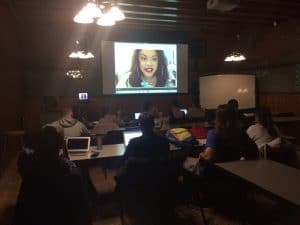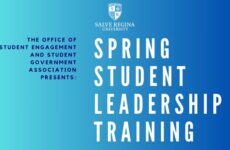By Marrissa Ballard | Managing Editor
At the end of a long hallway in the Antone Academic Center, strains of Kendrick Lamar’s To Pimp a Butterfly float from a classroom. This is the soundtrack to the #BlackLivesMatter course taught by Dr. Jordan Miller, a professor in the Religious and Theological Studies department.
The full name of the course is “Political Theology, Social Action, and #BlackLivesMatter,” and this is the first time such a class is being offered at Salve. Though it is offered through the Religious and Theological Studies department, the class features a mix of different majors, including Psychology and Biology. Miller, who specializes in religion, peace, and justice studies, has an open-door policy for all of his classes, and often welcomes guests to attend.
Miller also frequently invites guest speakers to chat with the students. The most recent guest was Johnetta Elzie, a prominent #BlackLivesMatter activist.

Sadé Farquhar, a senior Psychology major, had taken a capstone class with Miller before enrolling in the #BlackLivesMatter course. Farquhar believes that Miller encourages his students to think critically. “I was so used to memorizing definitions and quotes and being repetitive that I had forgotten how to conjure up a single new thought,” Farquhar said.
Farquhar thinks that the #BlackLivesMatter course has affected her in many positive ways. “This class has reminded me that I haven’t talked enough about the past and oppression in general,” said Farquhar. “It’s reminded me that it is so uncomfortable, but it needs to be talked about.”
“I used to just act like it wasn’t a problem,” Farquhar continued. “Especially at Salve, it’s really easy to pretend it’s not a problem.”
Farquhar also feels that in learning about #BlackLivesMatter, she gets to take a class that relates to her own experiences and feelings. In her time at Salve, Farquhar has often felt ostracized and left out. “Before this class, I never got any sort of acknowledgement from anyone – whether it be professors, students, or activities on campus – that said ‘hey, you matter, you’re such an important part of our university, and you’re diverse and we love you.’”
Liptak, speaking from the perspective of a white student, also reflected on what her friends and family will say about race and race issues. “The white person will question why there isn’t a ‘white history month’ when white history month is every month,” said Liptak. “When you hear that, it means that a conversation needs to be had.”
Reflecting on one of the books they read in class, called 100 Years of Lyncthings by Ralph Ginzburg, Liptak believes it is important to relate the violence of the past with the violence of today. “I think what people fail to realize is that the violence that we read about in history has only transformed into different kinds of violence that are still implemented by the same majority of people,” Liptak said. “Before, it was lynching done by white supremacists, and now it’s mass incarceration and police brutality.”
Wilmaris Soto, a senior Social Work major, believes firmly in recognizing the current race issues in society. “Black history is not over, it’s present, now more than ever.” Soto said. “You can talk about the history of racism but it’s still here, it’s the present, and it’s the future.”
As for the representation of black history and figures like Malcolm X or Dr. Martin Luther King, Soto believes that they have been generalized. “They want to whitewash these black protesters that tried to empower the black community, and whether they did it in a radical way or a more church-like way, these figures are not really being recognized like they should be,” Soto said.
All three women remarked that the class has taught them a lot, especially about #BlackLivesMatter. “The media made the movement look so violent,” Soto said. Learning about the movement, according to Soto, has demonstrated the history and emotion behind #BlackLivesMatter.
Dr. Miller, like the students, had not known that much about the movement before preparing for the class. “Prior to teaching the class I hadn’t studied the #BlackLivesMatter movement,” said Miller. “I was familiar with it from the media and activist circles, but I hadn’t put in the work on it. So I took this as an opportunity to really dive into how to think about #BlackLivesMatter.”
Miller’s #BlackLivesMatter course is not the only class engaging with the topic of race on campus. “There are racism-focused courses on the curriculum that are regularly taught,” Miller explained. “So it’s not that the conversations aren’t happening, it’s that they are happening in very specific places for very specific reasons. To my knowledge, I’m the only person teaching specifically about the #BlackLivesMatter movement.”
As for the controversy the movement has received, Miller is very critical. “You don’t go to a Breast Cancer fundraising event and say ‘there are other kinds of cancer, too,’ right?” Miller said. “If black lives do matter, because ‘All Lives Matter,’ then why isn’t the assertion that black lives matter validated?”
Miller has theories about why the phrase #BlackLivesMatter seems to cause so much offense. “The controversy, as far as I can tell, comes from the fear of a perceived loss of power,” said Miller.
Many Salve students, especially in Dr. Miller’s classes, have expressed a desire to see more classes like the #BlackLivesMatter course in the catalog. According to Miller, there is currently a discussion in the faculty assemblies about adding a component to the core curriculum that deals with multiculturalism or diversity. The details about the component or its progress are not set in stone yet.
Until the discussion about adding to the core curriculum is settled, Miller has other suggestions for diversifying classes here at Salve. According to Miller, professors can stop to ask themselves if their planned syllabi utilize diverse and underrepresented voices. Miller used the example of creating a class on theology. “We know that women and people of color have been writing theology from the beginning, so why aren’t they on the syllabus?” Miller explained.
According to Miller, committing to a diverse set of voices and using a majority of non-white, non-male, and non-heterosexual authors “requires no change in the administration.” Miller also asserted that “you don’t have to teach a course on #BlackLivesMatter to teach that black lives matter.” Instead of using separate classes to read underrepresented authors, Miller believes any professor in any department could commit to a more inclusive syllabus.
Soto, Liptak, and Farquhar all believe that a class like #BlackLivesMatter should be mandatory for all students. According to all three women, the only way to reach the majority of Salve students, who might not seek out classes like #BlackLivesMatter, would be to integrate a class into the core curriculum. “This class is crucial,” asserted Soto. “It should be mandatory.”
Liptak also notes the importance of discussion as a path to progress. “It’s such a bigger problem, it’s a whole society, and how do you even begin to change that?” Liptak questioned. “That’s another reason why it’s so important that we have these conversations, because we’re never going to get rid of that problem if we don’t talk about it.”
For Farquhar, taking the class has lead to a lot of personal growth. “I always felt ashamed to be who I am, and so I wasn’t really onboard with what the movement stood for,” said Farquhar. “But now, my ideas have changed. I’m starting to realize that it’s okay to be different, but I’m angry now. There’s so much beauty that comes with being black, and with struggling and growing as a person.”
The true effect of Miller’s teaching is most obvious in the fervor of his students. Several students mentioned that the class has given them the tools to communicate about race issues. “I always wanted to talk about it,” Wilmaris Soto said. “I just didn’t have the words to articulate it.”














